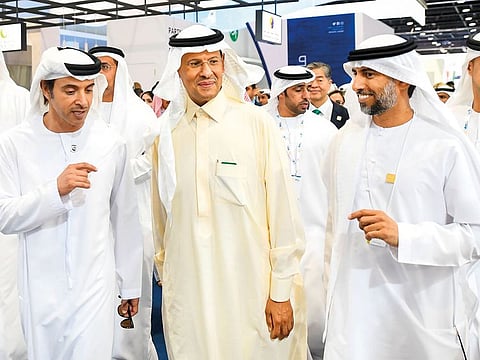$11 trillion in investment needed for oil and gas industry
UAE is on track to producing 4 million bpd by 2020, says Adnoc CEO Dr Sultan Al Jaber

Abu Dhabi
$11 trillion in investments will be needed for the oil and gas industry to keep up with rising global energy demands, said UAE Minister of State and Adnoc chief executive officer Dr Sultan Ahmad Al Jaber at the opening of the World Energy Congress in Abu Dhabi on Monday.
Taking place at the Abu Dhabi National Exhibition Centre until September 12, this year’s edition of the World Energy Congress — being held in the Middle East for the first time — sees over 15,000 attendees including at least 4,000 delegates and over 60 ministers from 150 countries.
The event comes at a significant time for the world’s energy sector with the demand for cleaner sources of energy as well as volatile markets brought on by the US-China trade war along with global weakening economic growth.
“In the short term, global economic uncertainties are creating market volatility and impacting the energy demand. But, in the long term the outlook is very positive and in fact robust,” said Al Jaber, delivering the keynote address.
“Population growth and the historic rise of the middle class leading to greater spending power are key [factors] … and as a result over three times the amount of energy currently consumed by all of Europe will be added to the global energy demand in the next two decades,” he added, highlighting the increasing energy demands the world will see in the future.
Al Jaber stressed the need for diversifying energy sources to include renewables as well as nuclear power, highlighting the UAE’s very own commitment to such policies with the Barakah Nuclear Power Plant and the construction of the world’s two largest solar power plants.
The minister, however, pointed out that oil and gas would still be among the top key energy providers in the long run and would need major investments to the tune of trillions in dollars.
“We know that the world will still rely on oil and gas as the majority source of energy for many decades to come — in fact about $11 trillion of investment in oil and gas is needed just to keep up with the current projected demand.
“Here in the UAE our wise leadership has set ambitious targets to remain a reliable and responsible supplier for the world’s energy markets. At Adnoc, we are on track to achieving our production capacity goals of 4 million barrels of oil per day by 2020 and 5 million bpd by 2030,” he added, highlighting the UAE’s growing oil production capacity.
“In parallel, by tapping into gas caps, undeveloped reservoirs and unconventional resources, we are unlocking vast reserves of natural gas,” Al Jaber said.
As one of the world’s leading energy providers, Al Jaber also said the UAE was committed to ensuring its energy production went hand in hand with environmental protection. “We produce among the least carbon-intensive barrels in the world. We lead the industry with the lowest methane intensity, and we are investing in technology that captures significant amounts of carbon dioxide from industrial sources.
“We launched the region’s first commercial-scale carbon capture utilisation and storage facility in 2016 and over the next decade, we will expand this program six times,” Al Jaber added.
Sign up for the Daily Briefing
Get the latest news and updates straight to your inbox



